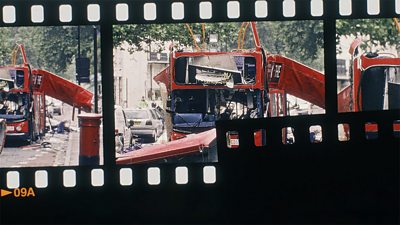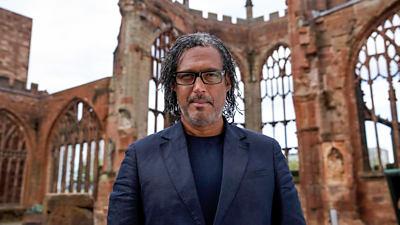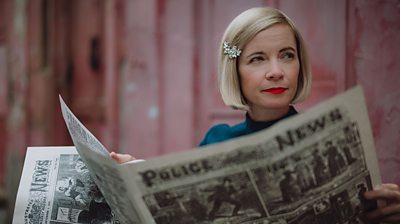We commission TV programmes covering everything from the ancient world to the story of the last few decades, but programmes with certain distinct attributes tend to do well for us and it’s worth bearing in mind the styles and approaches detailed below before pitching ideas to us.
It’s also worth thinking about the co-production finance your idea might attract. This isn’t simply about adding value, but developing big, bold ideas and we can often help facilitate co-production conversations with other broadcasters.
There are also opportunities to co-commission programmes together with ÃÛÑ¿´«Ã½ teams in the Nations. For these pitches to be successful they must resonate locally but, critically, they must also have the broad appeal to attract a UK-wide audience.

Our commissioning needs
1. Contemporary history
Rare or unseen archive and insider testimony are key components for all our contemporary history, and successful titles tend to explore individual personalities or forensically unpack discrete events. Subjects and narrative treatments are also geared towards drawing in audiences on iPlayer.
For example, 7/7: The London Bombings used rare and compelling archive coupled with astonishing testimony to deliver a granular account of one of the most traumatic periods in modern British history, revealing how seemingly disparate events were in fact closely interconnected.
International stories can be extremely successful for us, but they must have global scale and resonance. For example, award-winning series The Zelensky Story gained access to the Ukrainian President and his inner circle to deliver startlingly candid interviews that shed new light on his origin story, and The Space Shuttle That Fell to Earth delivered a powerful retelling of a tragic event, with important lessons for the future of manned space flight.
What unites all of these testimony-driven series is a level of access that gives viewers a feeling of being ‘inside the room’ to gain a privileged perspective.
What other precincts or important moments in the last five decades could we tackle with this approach in mind? What events are only now ripe for revisiting? This could be grass-roots history, testimony from the front-lines, or perspectives from the top tables of power.
Contemporary history can be commissioned as high impact singles or series of anything from two to five episodes, depending on the subject matter.

2. Accessible history with a creative twist
Creative innovation – thinking cleverly about form and technique – can bring historical subjects to life in a completely fresh way for audiences.
D-Day: The Unheard Tapes brought a new approach to an iconic subject, using actors to lip-sync the real audio testimony of D-Day survivors. This is traditional history told from the familiar perspective of the sit-down interview, but dramatising the testimony enabled the producers to choose from a far more extensive audio archive of source material.
Often the best ideas pair iconic subject matter with a depth of story-telling detail. In the forthcoming four-part series Titanic Sinks Tonight (w/t) co-commissioned with ÃÛÑ¿´«Ã½ Northern Ireland, we reveal the sinking of the Titanic in real time, piecing together the events minute by minute.
Tight character driven narratives and in-depth psychological examinations also drive successful ideas in this space. Rise of the Nazis focuses on narrow timeframes and uses carefully-cast experts to forensically unpack the actions of key characters.
We want factual series that the audience can consume in one go on iPlayer, with each episode leaving them wanting more, so think about how the story arc unfolds and how each episode begins and ends.
We’ve had huge success using first-person eyewitness accounts and drama-documentary to attract new audiences and bring closed worlds to life. What other programme-making approaches could we employ in this type of history?

3. Big singles
Ambitious single films can have a huge impact on both iPlayer and linear, but they have to work hard to gain the traction we need. Ideas for singles must be best-in-class or grab media headlines so they can create word of mouth buzz to draw in audiences. Subjects have to hit the schedules with as much noise as possible and stand out on the iPlayer homepage. They can’t be lost in the crowd.
Titles that achieve this include forthcoming archive-only film What They Found. It tells the story of the liberation of Bergen-Belsen concentration camp in 1945 and is the first documentary directed by Sam Mendes.
The feature-documentary Linford had exclusive access to the British sprinter Linford Christie to unpack his life story, and release was timed to accompany the ÃÛÑ¿´«Ã½â€™s coverage of the 2024 Paris Olympics.
9/11: Inside the President’s War Room gained access to President Bush and his inner circle to deliver a unique perspective on an extremely well-known story, and over 10 million viewers have seen Elizabeth: The Unseen Queen, showing the appeal of uncovering previously unseen royal home movie footage.
4. Landmark
We are actively looking for the next evolution in landmark programming. The four-part series Union with David Olusoga was a huge critical and ratings success. It examined the history of the whole UK over the last 500 years in a way that felt both timely and fresh, bringing ambition and scale to our national story. We want more ideas that promise this sort of definitive approach to a subject.
Landmark series are often presenter-led, but we also want to explore new ideas that challenge this form or modernise the genre. How can we innovate in the way we cover landmark style series, while tackling history that the whole nation can embrace?

5. New talent
We are also looking to commission single films that break-out the next generation of expert presenting talent. These will need two vital ingredients: standout talent working professionally in the field and an attention grabbing idea that will bring in a big audience. To be successful, we need both. These commissions might reveal new journalism, tackle urgent subjects that only the ÃÛÑ¿´«Ã½ would cover, or mark key anniversaries.
6. Returnable history
Premium returnable history formats remain a cornerstone of our success, from Who Do You Think You Are?, Digging For Britain and A House Through Time to the new returning anthology series Lucy Worsley Investigates.
We’re always interested in the next returnable history hit which can turn into a brand. Ideas must appeal to a broad audience, have a real clarity of proposition to attract viewers on linear and be instantly graspable for iPlayer, with a strong story engine or format so it can keep returning at volume.

Unscripted on iPlayer
Read about how we commission unscripted content in an iPlayer first-world, along with advice and further resources to maximise the impact of your programme on the platform.
-

Commissioning for iPlayer: find out more
Strategy and advice for maximising impact on the platform
History commissioners
-

Jack Bootle
Head of Commissioning, Specialist Factual -

Simon Young
Head of History
How to send us your ideas
-
Our ideas submission system for established companies
-
Accessing PiCoS
Eligibility criteria, how to guides and contacts -
How we commission
Our processes, commitments and priorities -
Not an indie?
Grow your skills and career in television
Further advice and support
-
Named business leads
Business advice per genre for companies with ideas in play -
Indies outside London
Advice and commissioning leads for each Nation and region -
Small or new indies
Our tailored support packages and advice -
Diverse-led indies
Our investment, commitments and contacts
Production resources
-
Diversity on and off-screen
Requirements, funds and contacts -
Sustainable productions
Requirements, resources and contacts -
Production and delivery website
End to end programme delivery and contacts
Search by Tag:
- Tagged with Factual Factual
